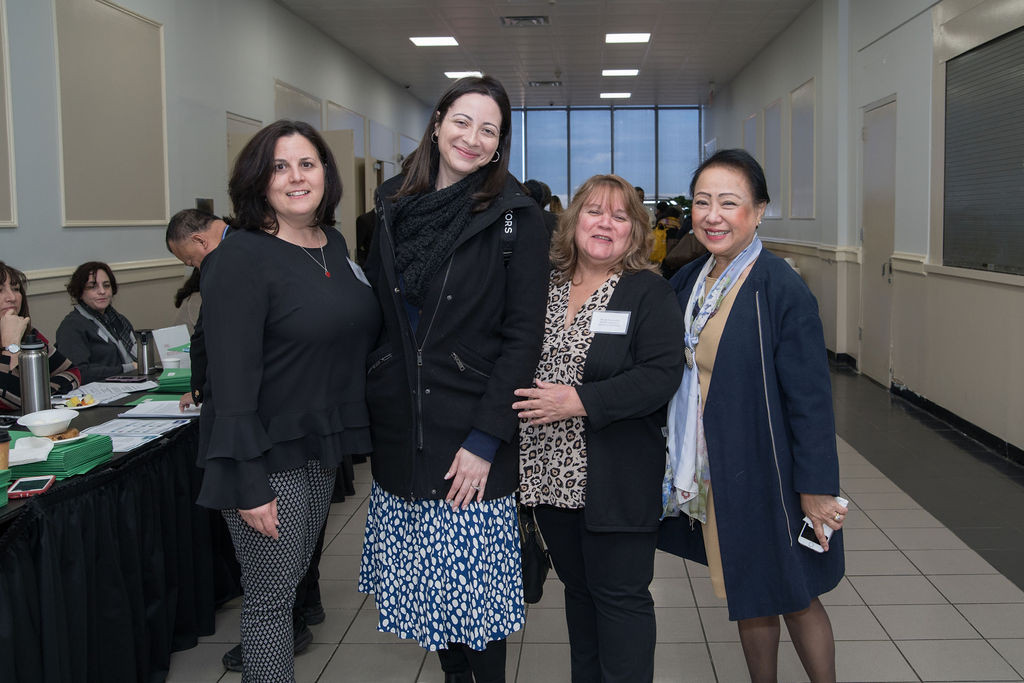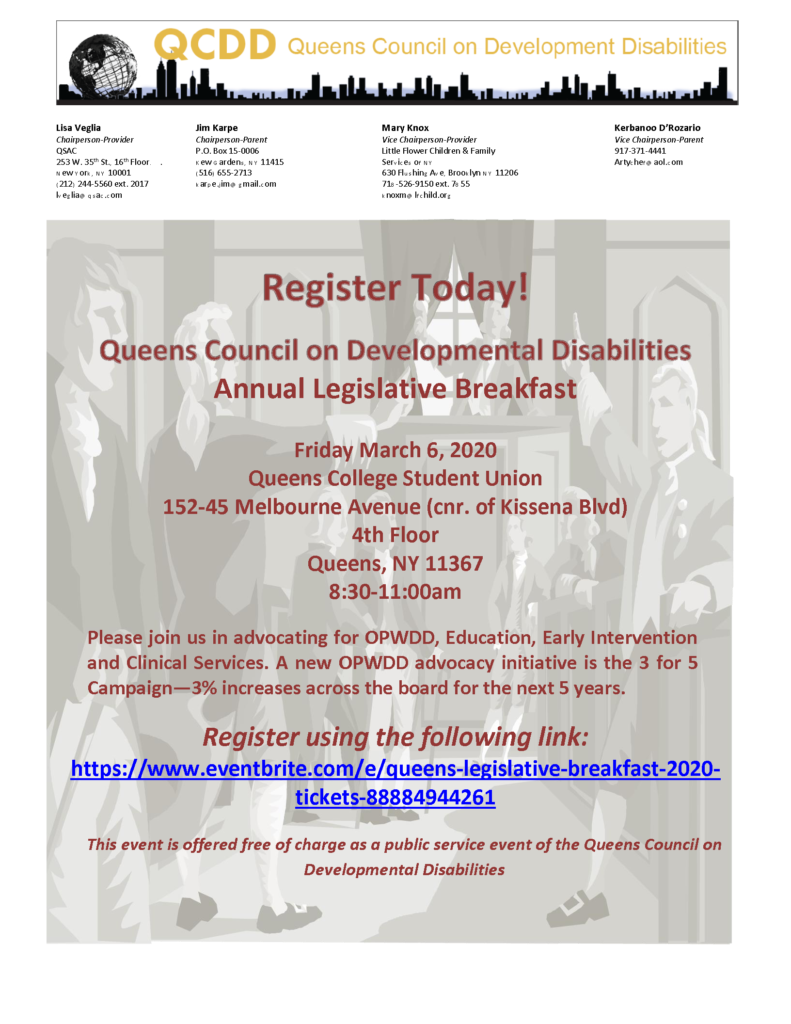Click here to view workshop videos from the 2020 Virtual Queens Family Support Conference.
Click here to view the 2021 NYC Local Services Plan.
Click here for the “Housing for People with I/DD ” presentation by John Maltby, Co-Director, NYC Housing Resource Center from the November 2nd Full QCDD Meeting.
Family Connect Summit Is now Virtual
Monday, October 19th, 2020
Our annual Family Connect Summit will be held entirely virtually this year! Register now, and we’ll email you on October 19th with a link to view all 8 of this year’s sessions. You can find information about each of these sessions below. The ADAPT Family Connect Summit is for professionals, families, self-advocates and all individuals interested in the latest information regarding intellectual/ developmental disability services and supports for children and adults.
Family_Connect_Summit_2020_Registration_FINAL
Family Connect Summit 2020 Program SPANISH – REVISED 9-14
Family_Connect_Summit_2020_Mailer_CHINESE_FINAL
Topic – Learning more about Wrap-Around services
Gerry Dohrenwend, CEO Cerebral Palsy of Ulster County will lead us through a discussion on innovative housing options.
Wrap-around services is a pilot program in which a traditional service provider supports an individual who wishes to live in a non-certified setting. Broad brush, the pilot program:
-
- Identifies an individual who wants to try this alternative.
- Matches them with mentors, staff members who will be the main contacts through the process of change.
- Uses CommHab hours to teach skills and habits needed for living more independently. For the pilot, this has taken one-year, on average.
- Moves them into their own house or apartment, with mentors coming to the new home on a daily basis and available on-call 24/7.
The experience has been that the on-call usage is initially very high, and then diminishes to almost nothing by the one-year anniversary of the move in. The pilot program moved 80 people.
From the August 3rd Meeting:
Powerpoint presentation on WCS (Wraparound Community Services)
Gerry Dohrenwend, CEO Cerebral Palsy of Ulster County will lead us through a discussion on innovative housing options.
Wrap-around services is a pilot program in which a traditional service provider supports an individual who wishes to live in a non-certified setting. Broad brush, the pilot program:
-
- Identifies an individual who wants to try this alternative.
- Matches them with mentors, staff members who will be the main contacts through the process of change.
- Uses CommHab hours to teach skills and habits needed for living more independently. For the pilot, this has taken one-year, on average.
- Moves them into their own house or apartment, with mentors coming to the new home on a daily basis and available on-call 24/7.
The experience has been that the on-call usage is initially very high, and then diminishes to almost nothing by the one-year anniversary of the move in. The pilot program moved 80 people.
From the June 1st Meeting:
Powerpoint presentation about IDD fatality rates in NYS during Covid-19
Fatality Rates for IDD Population in NY – Video
https://www.mc-cop.com/
https://opwdd.ny.gov/
Below are two items the Queens Council would like to share with our members:
- Summary of the NYS 2020-2021 Enacted Budget. The State budget was passed on April 3rd. Click here for the summary.
- OPWDD is offering virtual Front Door sessions for individuals and families in need of new or additional services. We were just informed that the 4/30 session is full, in case you are trying to register. The virtual webinars are being held statewide. The next webinar for NYC will be 5/14 at 10am , please see below for contact information to register.
Each region has their own schedule. NYC is capping at 200 with each borough allowed a specific number based upon need. Register by either calling the Front Door phone in their borough or by contacting a specific person in their borough:
Front Door:
Manhattan (646) 766-3220
Brooklyn (718) 642-8512
Bronx (718) 430-0757
Queens (718) 217-6485
Staten Island (718) 982-1913
Manhattan
[email protected]
Brooklyn Family Support
Service Advisory Council
Office: (718) 642-8512
Email: [email protected]
Website: www.bfssac.com
Bronx
[email protected]
Queens
[email protected]
Staten Island
[email protected]
*The QCDD Family and Community Support Meeting
that is scheduled for Friday, March 20th at Bernard Fineson
has been cancelled.*
Click to view the QCDD 2020 Legislative Breakfast Photos
Photo credit – Ellen Arocho Photography
Thank you to everyone who attended the QCDD Legislative Breakfast 2020!
Please join us for the next QCDD Full Council Meeting. Please note, it will take place at the Queens DDRO.
QCDD Full Council Meeting
Monday, April 6, 2020 at 9:30am
80-45 Winchester Blvd
Queens Village, NY 11428 United States
GOVERNOR CUOMO RELEASES HIS 2020-2021 STATE BUDGET PROPOSAL
Governor Andrew Cuomo unveiled his 2020-2021 $178 billion State Budget proposal on Tuesday, January 21, 2020. The $178 billion executive budget outlines a plan to reduce the growth of government spending and restructure the state’s Medicaid program to combat a looming $6.1 billion deficit.
Highlights include:
-
-
- MRT II: Reconvenes the Medicaid Redesign Team (MRT II), charged with identifying cost-containment measures to provide approximately $2.5 billion in gap-closing savings in FY 2021 and ensure Medicaid spending in future years adheres to the Global Cap indexed rate. The Team’s recommendations are due prior to the Enacted Budget.
- School Aid: A School Aid increase of $826 million, or 3 percent, with more than 80 percent of the increase targeted to high-need districts
- Marijuana: Legalize Adult-Use Marijuana
- Bail Law Reform: Proposes to update last year’s Bail Law reforms
- Middle-Class Tax Cuts: Continues middle-class tax cuts for 4.7 million New Yorkers earning under $300,000 a year and recommends no new tax increases
- Fighting Domestic Terrorism: Enact the “New York Hate Crime Anti-Terrorism Act” which creates a domestic act of terrorism motivated by hate crime as a new A-1 class felony punishable by up to life in prison without parole
- Prevailing Wage: Requires that workers on projects, with a significant public subsidy, would be paid a prevailing wage. This applies to projects valued at more than $5 million and exempts ESSHI funded projects.
- Paid Sick Leave: Requires businesses with five to 99 employees to provide their employees at least five days of job-protected paid sick leave per year and businesses with more than 100 employees, to provide at least seven days of paid sick leave per year.
- The Budget proposes substantial capital investments, including:
- $33 billion 5-year capital plan to tackle climate change
- $275 billion infrastructure program
- $133 million for homeless and affordable housing
- $2.9 billion to combat childhood poverty
- $12 million for emergency management equipment
- $147 million for the Olympic Regional Development Authority capital improvements.
- DOB has revised the tax receipts forecast across all years in the Financial Plan based on stronger receipts to date and updated economic information. Through the first three quarters of FY 2020, General Fund receipts, including transfers from other funds, totaled $57.8 billion, $1.5 billion (2.7 percent) above the initial estimate of which PIT receipts were $1.3 billion higher.
- County management of the Medicaid program: If counties stay within the 2% tax cap but exceed 3% Medicaid growth, they will pay for Medicaid expenditures above the 3% threshold for that year. If they stay within the 2% tax cap and under a 3% Medicaid increase, they get 25% of the savings. Counties that fail to stay within the 2% tax cap (including NYC which hasn’t been under the 2% cap), have to cover 100% of Medicaid growth
-
Highlights by Section:
OPWDD
-
-
- #bFair2DirectCare Increases & Minimum Wage funding: The budget contains $127 million (state & federal) in funding to cover the continuation of the 1/1/20 2% increase for 100 & 200 CFR Code positions and another 2% for the 4/1/20 increase for 100, 200, 300 CFR Codes. $44 million (state & federal) is included to continue the minimum wage increase. As part of the “two-year agreement” to provide these two 2% increases, there is no COLA in this budget proposal.
- Development: Once again the budget includes “additional State resources “that can leverage up to $120 million” all shares fully annualized (state and Federal) in additional funding available for “Program Priorities,” including; certified housing supports in the community; more independent living; more day program and employment options and increased respite.
- Housing: $15 million in capital funds to develop affordable, independent living housing.
- “Improve Accountability and Oversight”: Includes legislation that provides OPWDD with the authority to issue operating certificates to providers of certain Medicaid State Plan services. “The purpose of this legislation is to create more direct authority for oversight and ensure the quality of services by providers…and to eliminate duplication of efforts between multiple State agencies.” (See “CCO’s” below)
- “Promote More Efficient Use of State Resources”: “OPWDD will leverage federal Medicaid funding, utilize other supplemental aid where available and take other actions to more cost-effectively support the provision of person-centered programs.” Recoupments of surpluses in the supplemental room and board and other state fund payments should yield $10M, reduced State Operations overtime payments should produce $7M.
- Managed Care: Guidance on Specialized I/DD Plans – Provider Led (SIPs-PL) “is expected to be released for public comment soon.” Responses will inform OPWDD on the system’s fiscal and other readiness for Managed Care. In July 2018, OPWDD developed regional Care Coordination Organizations (CCOs) as a first step.
- Justice Center: Discontinue the requirement that every Justice Center investigation of abuse and neglect must also include a Statewide Central Register of Child Abuse and Maltreatment (SCR) check except in cases where the check may aid the investigation.
- July 2020 Rate Cut: While not explicit in the Governor’s proposal, there will be some kind of cut to rates in July of 2020. The savings are incorporated into the financial plan, which we have been advised amounts to approximately $22 million State share.
- CCO’s: $30M in savings are expected to be realized from reductions in CCO rates. Since the 90% enhanced federal support of CCO’s will be reduced to 50% in July 2020, OPWDD will provide $100 million toward their support. Additionally, OPWDD will seek to assume oversight of CCO’s from DOH.
-
SED
-
-
- School Aid: The proposed school aid increase is $826 million or 3.0% for a total of $28.5 billion which is the largest line item in the budget. If the school aid increase in the final budget is 3%, we will advocate that our 853 and 4410 schools get 3% growth as well.
- 4410 & 853 Schools: As expected, there was no additional funding for Excessive Teacher Turnover Prevention (ETTP) or any of the Regents proposals to add funding for teacher certification or loan forgiveness.
-
DOH
-
-
- Medicaid Redesign Team (MRT) II: the Governor has proposed reconstitution of the MRT to identify $2.5 billion in Medicaid savings. If the MRT II doesn’t come up with $2.5 billion in savings, the Governor’s budget proposal provides the authority for the Division of Budget to implement up to $2.5 billion in across the board cuts. Although the Mental Hygiene agencies, including OPWDD, are “excluded” from the MRT, OPWDD providers are the only ones that continue to have a 2011 MRT cut (#26) in place (Article 16s that provide more than the average number of therapies). The first MRT was given almost a year to identify savings but the MRT II has just two months. The short time frame will make it difficult to involve stakeholders and devise thoughtful strategies.
- Early Intervention: Although 42% of children who receive EI services have commercial insurance coverage, only 2% of EI services are paid for by commercial insurance. The other 98% is paid for by the state and counties (including Medicaid). The Governor’s budget proposes language to ensure that commercial insurers pay for covered EI services. The Governor’s proposal did not include language to initiate a “covered lives pool” for insurance coverage of EI services.
- Consumer Directed Personal Assistance Program (CDPAP): The Governor’s proposal names the CDPAP program for a large portion of the increase in Medicaid costs. It says, [Managed Long Term Care] spending growth overall – and CDPAP within it – have been the biggest drivers of spending growth in New York’s Medicaid program” and notes that “Between 2017 and 2018 alone, spending for CDPAP grew by 85 percent from $1.5 billion to $2.4 billion.” While DOH has put out the CDPAP RFO for Fiscal Intermediaries and the 12-12-19 proposed regulations on per member/per month payments, CDPAP is also included in the MRT II.
-
Budget Documents can be found here: https://www.budget.ny.gov
Staff contact: [email protected]
NEWS!
More than 90 organizations are urging Governor Cuomo to increase the rates for preschool special education programs (read the letter HERE).
Read the Daily News article: Agencies Urge Gov. Cuomo to Boost Funding for Special Education Preschool Amid Shortage
Reminder: There is no March QCDD meeting due to the Legislative Breakfast (details below!).
QCDD Full Council Meeting
Monday, April 6, 2020 at 9:30am
80-45 Winchester Blvd
Queens Village, NY 11428 United States
Please join us for the annual QCDD Legislative Breakfast 2020!
Fri, March 6, 2020; 8:30 AM – 11:00 AM
Student Union, 152-45 Melbourne Avenue, Queens, NY 11367
Meet local legislators, hear speakers discuss issues pertaining to the needs of people with Intellectual and Developmental Disabilities, join our letter writing campaign and have your voice be heard!
Join us in advocating for OPWDD, Education, Early Intervention and Clinical Services. A new advocacy initiative is the 3for5 Campaign—3% increases across the board for the next 5 years. Stay tuned for details after the Governor releases his budget.
Breakfast will be served.
This event is offered free of charge as a public service event of the Queens Council on Developmental Disabilities (QCDD).

